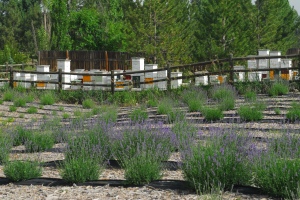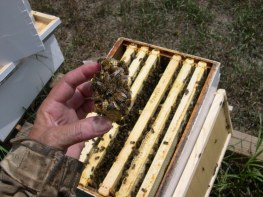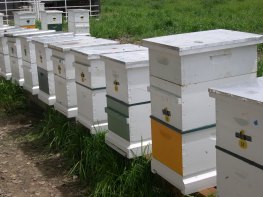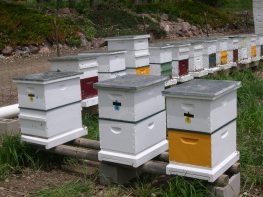Located in north Ft. Collins, Kris Holthaus, with Red Dog Expressions & Lavender Farm, is the Principal Investigator in this project. Keeping bees since 1978 she has actively been involved in raising resistant queen honey bee stock since 2001.
As a charter member in the Northern States Queen Breeders Association, and the Rocky Mountain Survivor Queen Bee Cooperative, she is committed and focused on maintaining healthy, productive, honey bee colonies.
April 24, 2014 – Our 38 packages to start the project were installed into 5 frame equipment. Luckily the weather was great for installation and it wasn’t until the following week that 40-60 mph winds continued for the week. The next week we had torrential rain followed by 8″ of wet snow. Colorado can be a challenge during the springtime.
The goal was to check queen acceptance at 10-12 days but with the weather conditions it made it very difficult. On May 14, 19 days after installation all the packages but one were found to queen-right with capped & open brood, drawing foundation and similar in strength. Luckily not much drifting of bees during the installation.
May 15, 2014 VSH Instrumentally Inseminated Breeder Queen is installed. Virgins will be reared and distributed to participating Colorado beekeepers. Additional queens will be reared and placed into our own project hives for study, testing, and potential propagation in 2015.
May 23, 2014 Installation of 6 project test queens into colonies that were made queen-less the day before.
 June 7, 2014 Well tended VSH queen cells from our Instrumentally Inseminated Breeder Queen are removed from the cell builder for introduction to Colorado beekeepers as part of our first virgin distribution scheduled for the Colorado Summer Bee College on June 14, in Silt, CO.
June 7, 2014 Well tended VSH queen cells from our Instrumentally Inseminated Breeder Queen are removed from the cell builder for introduction to Colorado beekeepers as part of our first virgin distribution scheduled for the Colorado Summer Bee College on June 14, in Silt, CO.
June 16, 2014 All of our test colonies have been building up since successful installation over the spring and early summer, filling and drawing out their first hive bodies. Over the next couple weeks we will provide additional space in the form of a second deep hive body that wintering in Colorado requires. It’s quite uncommon to have such uniform packages performing so similarly, but an added bonus.
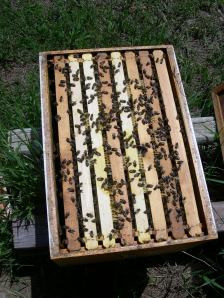 June 28, 2014 Project virgins were distributed at the Ft. Collins apiary within 4-6 hours from virgin emergence. They were all marked and caged with attendants to be followed throughout the project. Interested participants were shown slides taken from our Screened Bottom Boards on several of our test colonies for a hands on demonstration of what you would see in a natural varroa mite drop scenario.
June 28, 2014 Project virgins were distributed at the Ft. Collins apiary within 4-6 hours from virgin emergence. They were all marked and caged with attendants to be followed throughout the project. Interested participants were shown slides taken from our Screened Bottom Boards on several of our test colonies for a hands on demonstration of what you would see in a natural varroa mite drop scenario.
 Participant and northern Colorado beekeeper Krystal Domenico looking over a slide for a natural mite drop.
Participant and northern Colorado beekeeper Krystal Domenico looking over a slide for a natural mite drop.
Feeding the small nucleus colonies with the project queens was encouraged to support substantial egg laying potential.
 All available nectar is going to brood rearing within this colony which we will continue to support with weekly supplemental feeding. Pollen seems in abundant supply and pollen patties are not necessary.
All available nectar is going to brood rearing within this colony which we will continue to support with weekly supplemental feeding. Pollen seems in abundant supply and pollen patties are not necessary.
June 10, 2014 Additional test queens were installed into the project colonies after being made queen-less 24 hours previous. After 5 days the colonies will be checked for emergency queen cells and initial acceptance.
June 15, 2014 5 days after introduction in their cages, the most recent test queens were checked for acceptance by their colonies. If they were accepted with no aggressive behavior to the cage, the candy tube was exposed and the colony began to chew through the candy plug, quietly releasing the queen within 2-3 days. All emergency queen cells were also removed and the colony was not disturbed for 7-10 days.
August 10, 2014 Project queens that were locally reared and mated from our Instrumentally Inseminated VSH Breeder Queen were inspected and evaluated today after introductions several weeks ago. The brood patterns show they are doing well as they complete the total number of 36 test queens in our Ft. Collins apiary.
These sisters to the virgins that were distributed in June to the Colorado participants in our project, should provide invaluable feedback within our project. Similarities will be evaluated as we judge these queens throughout our Colorado regions in the coming year.
All the colonies in Ft. Collins are being evaluated and equalized for wintering strength. The nectar flow was surprisingly absent this year in Ft. Collins. It will be a push to get all the project colonies up to weight in both bees and stores before fall.
September 2, 2014 Fall feeding and colony readiness for winter is being evaluated on all the project hives. Out of 36 test queens installed 1 was found to be superceeded but the daughter is doing well. At this point they will remain in the project and evaluated for hardiness and resistance as the others.
While the project hives have plenty of pollen stores, additional 5 frame nucleus hives that were set up to include some of the additional virgins used in the project were fed pollen patties and syrup to make sure they are up to wintering strength in bees and stores.
October 29, 2014 The last of the feeding and now for my northern Colorado Step 1 in winterizing: Adding R6 insulation to the 36 project hives. The goal is to moderate the temperature swings inside the colonies so the cluster is able to over winter efficiently.
December 25, 2014 Step 2 was packing all the hives together into 6-8 packs to winter more efficiently. Hopefully this set up offers additional wind, rain, snow and cold protection. A White Christmas for all this year. -17 is the low expected tomorrow!
May 24, 2015 Testing for all overwintered project hives begins.
24 hour natural varroa mite drops are recorded from screened bottom boards.
 Bees are collected for alcohol wash.
Bees are collected for alcohol wash.
Hygienic behavior is measured with liquid nitrogen over a 24 hour period.

Sample cell recapping sums are taken in a patch plus additional fertility of the varroa mite are measured within the brood area.
Collected data now shows those hives with the greatest resistance to pests and disease over a Colorado season. Spring build up, colony strength, honey and pollen stores remaining in the hives, and the colony disposition will be used to make selections to rear additional queens for distribution to CO area beekeepers.
Results from Testing

